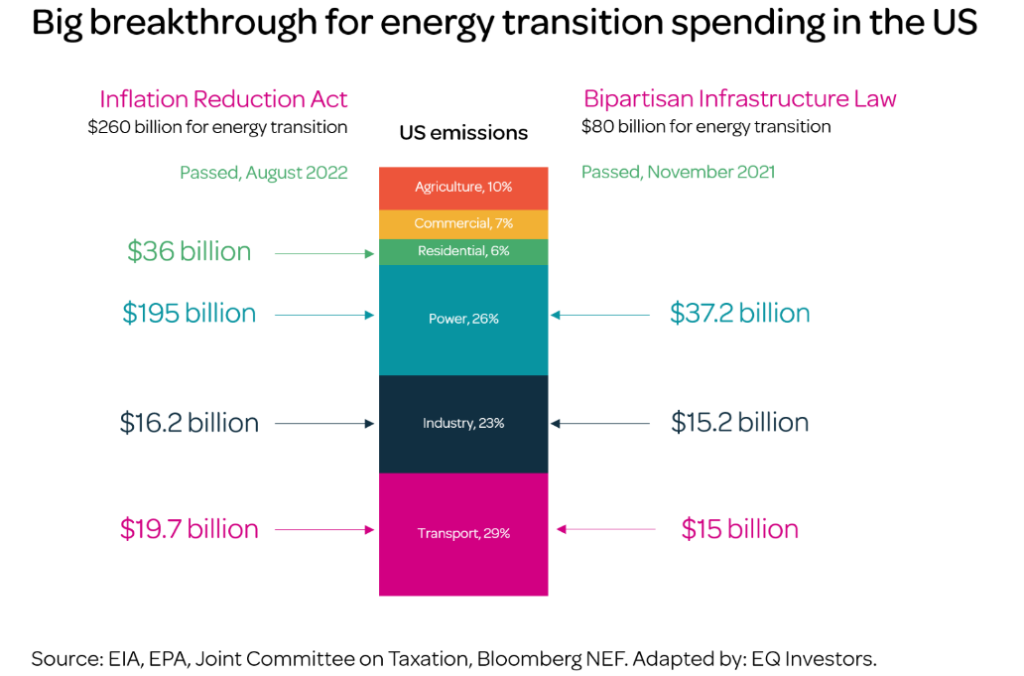Driving investment in clean energy and low-carbon technologies
The Inflation Reduction Act (IRA), signed into US law in August 2022, offers an unprecedented opportunity to lower energy costs, increase investment in clean energy economic opportunities, and stimulate jobs and economic growth.
By offering incentives to businesses, the IRA aims to jump-start investment in clean energy and the adoption of law-carbon technologies, while also supplying funding for the development of new clean energy technologies such as clean hydrogen and carbon capture and storage.
While it aims to achieve this by expanding US domestic manufacturing capacity there is room for free-trade partners and ‘friendly’ countries to benefit too.
Compelling investment opportunities
The implementation of the Act will set aside $260 billion of tax cuts and investment incentives that will help drive the energy transition in the US. This is in addition to an $80 billion package passed in November 2021.

Together, these packages are likely to influence the capital allocation decisions of several trillion dollars of corporate investment over the next decade.
What are the latest developments?
A significant transformation of US green manufacturing capabilities has now started raising eyebrows in Europe and other parts of the world.
According to the Financial Times, primarily under the IRA but also through the Chips Act, companies have already committed more than $200bn of US manufacturing projects since August last year. It is double the commitments made in 2021 and nearly 20 times the amount in 2019!
It represents over 75 projects worth at least $100m each for plants to manufacture electric vehicles, semiconductors, or batteries. Those commitments are already expected to create about 82,000 new jobs with more projects expected to be announced in the coming months.
The implication for Europe – EV battery example
An industry that stands to benefit from increased investment is battery manufacturing. In addition to the environmental case, one of the key motivations for the US to incentivise domestic investment is to build up its own production capacity in a market that is heavily dominated by Chinese manufacturers.
The global market for lithium-ion batteries, which are used in electric vehicles and renewable energy storage systems, is projected to reach $129.3 billion by 2027, growing at a compound rate of 18.0% a year from 2020 to 2027, according to a report by Allied Market Research.
Northvolt, a Swedish battery manufacturer that produces sustainable, high-quality batteries for electric vehicles and energy storage systems, has recently raised $2.75 billion in equity to expand its production capacity, which will help to meet the growing demand for batteries. Northvolt is a leader in Europe and the main challenger to the dominant Asian producers such as China’s Contemporary Amperex Technology Co. Limited (known as CATL) or South Korea’s Samsung SDI or LG Energy Solution.
In a sign that companies are being swayed by the incentives on offer under the IRA, Northvolt has postponed its plans to construct a German based ‘gigafactory’ jointly with Volvo Cars until later in the year. The management team are currently considering whether the facility should now be based in the US.
Green subsidy race
With business decisions now starting to favour US production, the EU has begun to outline how it plans to incentivise green industries over the coming years. We expect regions across the globe to launch their own versions of the IRA, unlocking the green investment needed to achieve the transition to net zero by 2050.
As the global push towards a low-carbon future gains momentum, investors with an eye towards climate change have an opportunity to invest in businesses that are at the forefront of this transition. We believe that the EQ Portfolios are well positioned to take advantage of these significant opportunities.